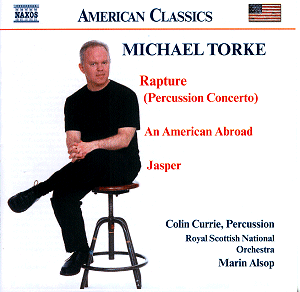Michael Torkeís music, which has been fairly well served
by recording companies over the last few years, is straightforward,
colourful, full of rhythms, unashamedly tuneful and direct in appeal.
Some of his earlier works still bore Minimalist influences, later replaced
by a more directional expression taking the listener "from A to
B with the anticipation of C", as he himself puts it in his notes
for the present release. His often exuberant and optimistic music is
best summed-up, I think, in his lively Javelin composed
for the 1996 Olympics. The works recorded here clearly display a similarly
happy and positive music making. These are quite recent pieces, since
the earliest one, Jasper was composed in 1998. Jasper,
a tone poem in all but the name, was inspired by the place where it
was composed, though it is conceived as a theme and variations on a
seven-note diatonic melody (i.e. the white keys). This joyful, outdoor
music breathes the same air as Javelin.
An American Abroad, "a travel-log,
a slide-show of images" (the composerís words), is an orchestral
fantasy suggesting "the natural naïvety an American might
feel travelling abroad". This is yet another telling example of
this composerís uninhibited, happy music making, evincing a penchant
for outstretching the musical material. Quite attractive and enjoyable,
it tends to ramble, and might have benefited from being a few minutes
shorter.
The recent percussion concerto Rapture,
written for and first performed by Colin Currie, is a brilliant and
superbly crafted display of virtuoso writing using a wide-ranging array
of instruments rather than merely relying on mallet instruments, as
is now too often the case with many recent percussion concertos. Drums
and Woods in the first movement is a lively, energetic Toccata with
many insistent rhythms; while Mallets is the song-like second
movement and Metals the final Rondo.
As already hinted at, Torkeís music does not plumb
any great depths (though his superb choral Book of Proverbs,
an altogether more serious piece, clearly demonstrates that he can do
so); rather it is hugely entertaining. The music is also superbly crafted
and unpretentious in its own way, which is one of its most endearing
qualities. Present-day Americana, superbly played and recorded, to be
simply enjoyed for what it is worth.
Hubert Culot

